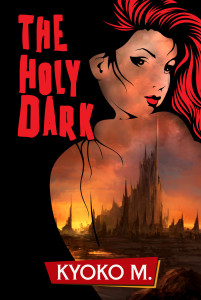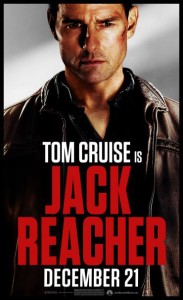Enter to win a free signed paperback copy of The Holy Dark. Deadline is April 24, 2015. Don’t miss your chance!
Archives for : March2015
(Author’s Note: This is actually a rare re-post of a blog I wrote back in 2013 shortly after sitting through the exhausting, disappointing Jack Reacher. It is two years old, but since I also just sat through the absolutely abysmal Chappie, I felt it necessary and relevant to post this blog. Please enjoy.)
So I just watched Jack Reacher last night because my parents claimed it was alright.
It was not.
And that is an understatement.
However, it’s not like this is the first time I’ve seen a hair-tearingly stupid movie. I have also subjected myself to A Good Day to Die Hard and RIPD this year. Yes, yes, I should have known better, but when you’re wrong, you’re dead wrong. Still, every horrible experience I’ve had sitting in a theater has taught me something.
Respect your audience’s time. Specifically, I am referring to pacing a story. Jack Reacher had abysmal pacing. For instance, the first five or six minutes of the film has absolutely no dialogue. I have seen movies where this is effective and sets the mood. In this particular film, it felt pretentious and exhausting. It didn’t enhance the evil nature of the bad guy and it didn’t make the character we were introduced to seem intelligent or quirky. It was just boring and unnecessary. Pacing means that the events of your story glide into each other, whether it’s a romantic scene followed by a violent scene, a violent scene followed by a humorous exchange, an action scene followed by a quiet denouement, or any combination of different sequences. If at any point during your movie, a non-idiotic audience member checks his/her watch, something is deeply wrong. This is not to say that everything should be fast and hectic—that was one of the main pitfalls Legend of the Guardians: The Owls of Ga’Hoole—but you have to spend time on things that matter and omit things that aren’t relevant to them.
Write good characters and we can pretty much sit through anything. Think about ten of your favorite films off the top of your head. How many of them have premises that are absurd if explained out loud? I know plenty of mine do. However, if you write enjoyable or relatable characters, your audience won’t care that the plot is silly. Perfect example: Clive Owen’s hysterical action flick Shoot ‘Em Up. About 99% of what happened in that movie was physically impossible and utterly ridiculous. Why did I love it? Commitment, man. Clive Owen nailed every single one-liner with his perfect deadpan expression and I adored his character—carrot chewing, cynicism, and all. What’s the reverse of this effect? A great plot with horrible characters. We’ve all seen it before. Hell, I can rattle off examples with ease: My Super Ex-Girlfriend, Push, Jumper, The Last Stand, and RIPD. In my personal opinion, those movies had plots that sounded interesting that were executed horribly. Some of them failed for several reasons, but the common element is unlikable characters. Jack Reacher had this problem as well. There were exactly two types of characters: morons and douchebags. Some were a combination of both. Terrible writing will strangle a great concept in its crib and you’ll be left there weeping. Many writers advise to build a novel, script, or short story from the character outward. I agree completely. We have to like the guy or gal we’re riding piggyback with or nothing will pan out.
Commit. I have an entire laundry list of awful movies that I love with full awareness that they are awful. I am able to freely admit this because 90% of the bad films I enjoy committed to their premise or their characters. For instance, my number one guiltiest pleasure of all time is Hudson Hawk. No, no, don’t close your browser yet! Let me explain. I love Hudson Hawk, if only because everyone—and I mean, everyone—in that silly mess of a film committed to that incomprehensible, ludicrous script of theirs. They just nailed it. No one half-assed any of their scenes and so the movie turned into the beautiful butterfly of horribleness as a result. To me, nothing is worse than being mediocre or half-hearted. I’ve read plenty of books in time and the ones that frustrate me the most are the ones that don’t commit to an idea.
I try not to name examples, but the main offender on my list is ‘City of Bones’. Great concept, great conflict, great world building, but one truly half-assed main character. I just couldn’t get into it even though I liked Jace and Simon and the other Shadow Hunters just fine. Clary was a loaf of Wal-Mart brand bread to me—bland, dry, and forgettable. This is not to say the books are bad. Not in the least. I actually think the writing is quite good and I recommend them with no remorse, but that series is something I can never get into because I feel like the author didn’t commit to making Clary a distinct protagonist. I believe this is possibly the most important part of the writing process—setting the main character apart from her supporting cast and from characters outside of the novel itself. I am the first person to slam the ‘Twilight’ novels, but at least Bella Swan was her own person. True, she was a perfectly repugnant person, but she was still an individual and no one can really replicate her. (Though E.L. James tried her damnedest.)
Weak villains will kill your story. Not physically weak villains, mind you. Villains who aren’t threatening are also something that makes me want to kick puppies. Jack Reacher was definitely guilty of this. Mr. Potato Head—sorry, Jai Courtney—was kind of intimidating if only for being a cold-blooded sniper, but his “boss” was the least scary villain I’ve seen in ages. Oh, gee, he has one blind eye and no fingers! Bring me my brown pants! Building up a good villain is one of the most important parts to a story because otherwise, your protagonist—no matter how charming and funny and cool—will have no dragon to slay. Winning an unwinnable war is what makes someone a hero, whether that war is literal or not. Creating a slimy, obsequious villain is essential to draw a line in the sand and make the stakes as real as they can ever get. Want an example of what happens when you don’t do that? The Happening. ‘Nuff said.
Kyoko

